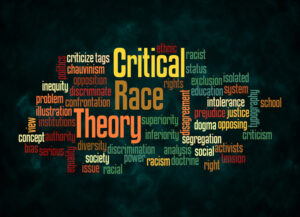The School Board Is Intentionally Violating Established Policy
Introduction
This is the 4th post in a series about the Controversial Issues Policy of the Fairfax County School Board.
As outlined earlier, the Board undertook a program in 2020 to implement significant changes in its curricula. The intent was to put “equity” at the center of everything.
The Board recognized at the outset that its plans would violate its long-standing Controversial Issues Policy. Why? Because the Policy calls for neutrality in classrooms, whereas the Board wanted to enable teachers to take sides on hotly contested issues such as “privilege” of white people; “institutional racism” against blacks; stressing the separate “identities” of different racial, sexual, and sexual orientation groups; and adopting principles of “equity” (i.e., not just levelling the playing field, but levelling outcomes along racial lines).
Therefore, simultaneously with its development of the new curricula, the Board initiated a process to revise the Controversial Issues Policy so as to exempt its race-based instruction from the general rule that teachers must remain neutral.
The revisions in the Policy got bogged down for eighteen months, however, and as of the date of this post, the Policy remains the same as it has been for many years. The facts are summarized in “The Saga of the Controversial Issues Policy — Part 1, Part 2 and Part 3.
Meanwhile, the Board has gone ahead with its race-centric curricula. The result is that the Board is knowingly, intentionally violating existing policy.
The Board’s Social Studies Curricula Is Very Controversial
The Over-Arching Themes Are “Power, Position, Bias, Identity, and Social Justice” 
In the past year, the Board has revamped social studies courses to focus on racial discrimination, white power, and identity politics. The facts in this regard are summarized in a prior post, “Fairfax County’s Race Centric Curriculum for U.S. History,” Jan. 21, 2022. For example, the curriculum guide for the 11th grade U.S. History course explicitly states:
“Students will demonstrate history and social science thinking skills and practices, with an emphasis on the concepts of power, position, bias, and agency, and apply them to their learning regarding their identities, communities, states, the nation, and the world.” (Emphasis added)
Almost every lesson drums these concepts into students’ heads with unrelenting hammer blows. The U.S. History course begins with a two-week segment on “Why & How We Study History.” The focus of this segment is supposed to be:
“Unit Essential (Priority) Standard(s)
1. Students will demonstrate history and social science thinking skills and practices, with an emphasis on the concepts of power, position, bias, and agency, and apply them to their learning regarding their identities, communities, states, the nation, and the world.
ID.2 -Students will develop language and historical and cultural knowledge that affirm and accurately describe their membership in multiple identity groups.
DI.10 Students will examine diversity in social, cultural, political and historical contexts rather than in ways that are superficial or oversimplified.” (Emphasis added.)
The second segment of the U.S. History course covers “Early America: Settlement and Colonization.” The central theme of this two weeks of instruction is:
“Students will apply social science skills to understand the impact of the European Age of Exploration by analyzing the cultural interactions among American Indians, Europeans, and Africans, with a focus on the influence of power, position, privilege, and/or agency in the development of the 13 colonies.” (Emphasis added)
An examination of the detailed course guide for the “Early America” segment (HERE) reveals that the focus is almost entirely on injustices, with little or no emphasis on the reasons why people emigrated from Europe, relations with Great Britain, governance of the colonies, relationships among the colonies, etc.
And so it goes, lesson after lesson, week after week of instruction.
The same themes permeate other social studies courses. A shocking example is the “U.S. Constitution and Federalism” unit in the 12th grade U.S. Government course. The guide for this two-week segment of the course is HERE. As you can see, teachers are told to present the drafting of the Constitution as “a study in power and privilege” (evidently, white men disregarding the rights of women and African Americans). Students are supposed to learn about our federal system of government from the perspective of “the concepts of power, position, bias and agency.” (Emphasis in original) Thus, under the tutelage of the Fairfax County school system, our students are now supposed to learn that the U.S. Constitution — perhaps the greatest achievement in governance in the history of the world — was actually a mere exercise in power and bias, designed to protect people in positions of authority from others.
No one can possibly contend that this curriculum is impartial, as required by the Controversial Issues Policy. To the contrary, it is a distorted, one-sided, race-centric curriculum of the kind favored by zealots who want to tear down our institutions.
The Board Isn’t Just “Teaching History.” It Is Indoctrinating Kids About the Present. 
It’s bad enough that the School Board’s curricula sees all our history through a narrow lens of discrimination. It’s even worse that the Board is now using history and civics classes to indoctrinate students with its controversial views about today’s social policies.
The Board denies that it is teaching Critical Race Theory (“CRT”). Rather than getting caught up on semantics, the citizens of Fairfax County should focus on what its school leaders are emphasizing. There is no question that Board is pushing the lingo and ideas of CRT, which include:
- “Institutional racism” — the idea that our education system, and society at large, stack the deck against certain racial minorities.
- “Privilege”/”White Supremacy” — the idea, related to “institutional racism,” that our education system and society at large entrench the interests of whites over minorities.
- “Power” — the idea that the actions of persons in authority (e.g., our Founding Fathers) are generally motivated by a desire to protect their personal interests, not the common good.
- “Identity” — the idea that the a person’s place in society is generally determined by his or her immutable characteristics (race, ethnicity, sex, sexual orientation). Also, the idea that students should be taught to view the world in terms of their “identity” or “multiple identities” (e.g., I am a black, lesbian woman and therefore am subject to multiple forms of discrimination).
- “Equity”/”Social Justice” — the philosophy that mere equality of opportunity is disguised racism, and that government has a duty to ensure equality of outcomes.
- “Anti-racism” — the philosophy that government institutions should not be race-neutral or colorblind; rather they have an affirmative duty to achieve “equity.”
These ideas have been accepted wholeheartedly by the School Board. They permeate policy discussions, everyday discourse among the school leaders, and the curricula.
At the kick-off session of the 2020-21 school year — the session at which CRT guru Ibram X. Kendi was paid $20,000 to espouse his ideas — School Superintendent Scott Braband gave a speech entitled “With Equity at the Center” at which he stated that a “defining moment” had arrived for Fairfax County Public Schools, “a moment for racial and social justice.” He vowed to put “equity at the center of everything we do.” He committed to use the schools to challenge ” white privilege” and “systemic racism,” and “committing to be anti-racist.” He said that the school system must “commit to a shift” to put “equity” at the center. He promised that henceforth “equity” would not be “a thing”; it would be “the thing.” Braband’s remarks were followed by those of Assistant Supervisor Nardos King, who displayed Ibram Kendi’s How to Be an Antiracist and suggested that the academic performance of black students in predominantly black schools should be measured by different criteria than are used to measure white students in predominantly white schools. The speeches can be viewed at https://www.youtube.com/watch?v=WOKQZSNwIh0.
These CRT ideas have been incorporated into the curricula, not only as a way of evaluating past history, but also in terms of how they should view the world today. As already quoted above, the over-arching objective of the 11th grade U.S. History course is that: “Students will demonstrate history and social science thinking skills and practices, with an emphasis on the concepts of power, position, bias, and agency, and apply them to their learning regarding their identities, communities, states, the nation, and the world. (Emphasis added)
The Board’s curricula achieve the objective of applying the concepts of “power, position, bias and agency” to today’s world in two ways. First, teachers are directed to pose questions in the classroom that will promote these ideas. For example, the unit guide for the segment of the 11th grade U.S. History course on the Civil War and Reconstruction period suggests that teachers relate that period of time to the present by asking their students, “How does the Civil War and Reconstruction impact our national identity and unity today?”, or “How does the past impact present understanding, systems, and actions regarding prejudice and social bias?” The unit guide is HERE. Second, teachers are directed to encourage students to get involved in activities that combat racism. See, e.g. “Cultural Responsiveness in FCPS Social Studies.” While student involvement, at least for older students, may seem commendable in theory, one must ask what groups/activities the students are being encouraged to join. Once the door is opened for teachers to steer their students towards activism on particular issues, substantial controversy is inevitable.
Conclusion
Eighteen months ago, the Board recognized that its plan to implement race-centric curricula would violate the school system’s Controversial Issues Policy. The Board recognized that the Policy would need to be revised to allow the curricula’s controversial ideas to be taught. And yet, it implemented its privilege/institutional racism/identity politics teaching without amending the Policy.
It appears that the Board may now be planning to enact a new Policy after-the-fact. The content of that proposal will be analyzed in the next post. It is important for parents and all citizens to understand that proposal, for it would radically change the policy of neutrality in divisive and dangerous ways.
If you believe this post is informative and useful, please share it with others, and encourage them to register for future updates on this site.



What kind of human being would want to damage children in this way?
Great, in depth work. Since they are intentionally violating their own stated policies, might the board have some liability, either civil or perhaps even criminal?
I don’t know of any liability they might have, other than being voted out of office.
These posts have me searching for Homeschool History classes for my high school and middle school children. Fighting so-called “city hall” will take longer and risks exposing my children to this crap. I would consider arranging their schedule so they leave West Springfield HS early on the days they would normally have History and come home to learn from a Classical curriculum here. I remember the math geniuses in my high school class would do this. They left after lunch to go to NOVA to take college level math while the rest of us were slugging it out in geometry! Why can’t the same happen for History? It just takes planning and coordination. Pulling my children out completely might backfire on us from a social standpoint. Perhaps this is the answer. It would strike me funny if there was a mass exodus of kids from the school on History class days. (Only in my dreams, I know, but a delightful thought!).
The revelations of the intent to promulgate racial bias in the classroom is pretty scary. After years of civil rights education, I was more under the impressions the schools were to stress acceptance of individual contributions to our society regardless of race, creed, etc. Why are we going backwards??? Keep up the good work. In presenting the TRUTH. It needs to be heard. Thank you. Kathy
Thank you Mark. The work you are doing is so invaluable.